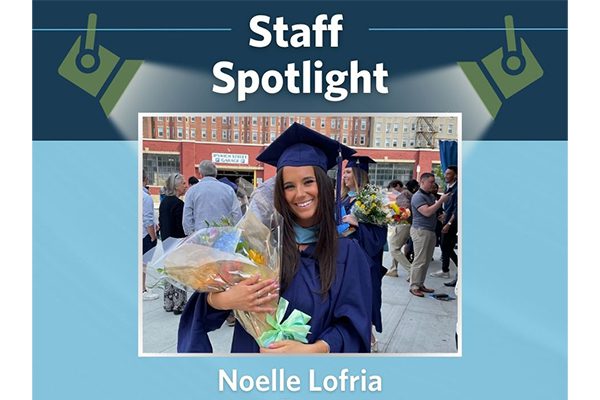Noelle Lofria has worked in The New England Center for Children’s (NECC) Partner Program for three years and currently serves as a tutor at an elementary school in Derry, NH. Lofria, who graduated with her master’s degree from Simmons University last month, was nominated by colleagues because “she is a creative and upbeat member of our team. She is always flexible to the needs of the classroom and to assist others. Her attention to detail and relationship with the general education teacher have supported her case student in making some wonderful progress. It is a delight to watch her teach.”
How long have you worked for NECC?
I started at NECC in June of 2020. I started in the Partner Program working with high school students in Derry. This past August, I switched to an elementary school in Derry working with kindergarten through fourth graders.
What is your favorite part of your job?
I love seeing the progress students make whether it’s daily, weekly, monthly, or yearly. It is incredible to see their growth and development as they meet milestones that further their independence and education. I am blown away on a daily basis as students make progress toward their goals. They love to share it with their teachers.
What are your daily duties/schedule like as a tutor in Derry?
As a tutor in Derry, I summarize curriculum and behavior data, follow the students’ typical school day schedule, accommodate, and modify general education curriculum on the fly, and work with colleagues in the classroom to help our students succeed.
What is something you would like people to know about working in the partner program?
Working in the Partner Program allows individuals in the school system access to ABA services and support, which are paired with clinical practices. This allows students to remain included in their classrooms and in their school district with their typically developing peers. I love the concept of inclusion, as it allows our students to experience various dimensions of socialization and learning. It also helps the school to foster neurodiversity and acceptance.
Why did you choose a career in helping children with autism?
My aunt has been heavily involved in special education her whole life. During college, she hired me to work in an extended school year classroom as a summer job. I fell in love with helping children with autism.
Why NECC?
My cousin works for NECC and introduced me to the organization. After doing my own research and talking with her, NECC felt like the right fit for me. I have thoroughly enjoyed my experience working with various age groups and have even taken advantage of the free graduate programs!
How have the grad programs or teacher training at NECC affected your teaching style?
This past May, I graduated from the Simmons program with a master’s in education specializing in severe education. It has greatly affected my confidence and knowledge in teaching individuals with autism, as well as communicating with staff in the classroom. I feel fortunate to have had the opportunity and am transitioning to the role of a classroom lead this fall.
What is something about you that your colleagues might be surprised to learn?
I am super into the sport of boxing. Not only do I train for the sport myself, but I also love to watch it. I also really love going to the beach and baking desserts for friends and family.
Who is someone you look up to?
Someone I look up to at NECC in the Simmons program is Heather Fortin. She is extremely caring and wants all of her students to succeed. She has been a great mentor during my practicum year and created a supportive environment during what can be a stressful time of studying for a graduate degree.
What is your life philosophy or motto you like to live by?
A motto I like to live by is, “You can’t wake up and assume that opportunities are going to happen to you.” To me, life is about advocating for yourself and taking risks for your benefit. I feel like this translates over to my philosophy in education, which is emphasizing the importance of self-advocacy.

